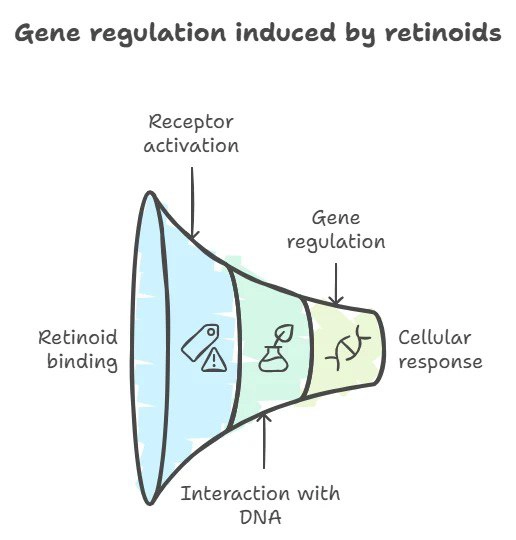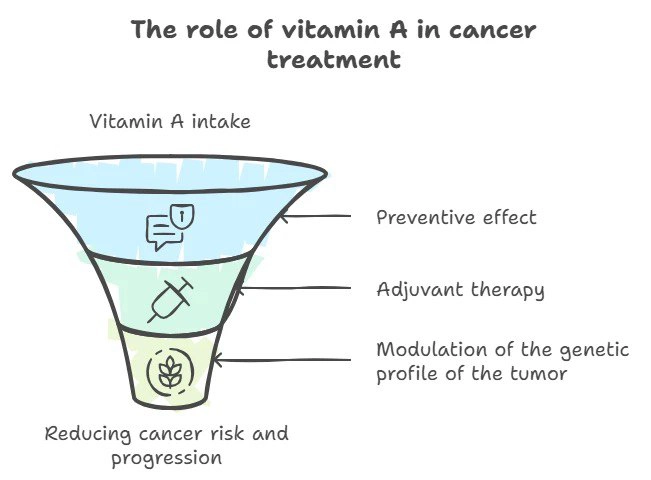

Vitamin A (retinol) and its derivatives (retinoids) have long been known for their beneficial effects on skin and vision.
However, in recent years, interest in their role in modulating genetic expression and regulating tumor cell growth has been increasing.
In this article, we will review the mechanisms of vitamin A action at the genome level, analyze existing and promising methods of its application in oncotherapy, and present the results of some clinical and preclinical studies.

Vitamin A is involved in cell differentiation and control of cell proliferation.
It is well known that disruption of retinoid receptor signaling may contribute to oncogenesis.
In the context of oncology, vitamin A and its synthetic analogs (so-called retinoids) are considered as potential modulators of the expression of genes affecting tumor growth and development.
This opens the way to new therapeutic approaches aimed not only at destroying tumor cells, but also at correcting their molecular profile.

Mechanisms of regulation of genetic expression by vitamin A
The action of retinoids is based on their ability to bind to nuclear retinoid receptors: retinoic acid receptors (RAR) and retinoid X receptors (RXR).
These receptors, upon activation by vitamin A or its derivatives, form heterodimers by interacting with specific regions of DNA – retinoid-responsive elements (RARE).
This results in activation or repression of transcription of certain genes related to cell cycle, apoptosis, differentiation and immune response.
Table 1: Main types of retinoid receptors and their functional role
| Receptor | Ligands | Basic functions in the cell |
|---|---|---|
| RARα, RARβ, RARγ | Retinoids (including retinoic acid) | Regulation of gene expression, control of differentiation and proliferation |
| RXRα, RXRβ, RXRγ | Retinoids, 9-cis-retinoic acid | Formation of heterodimers with RAR, PPAR, VDR, etc., modulation of a wide range of genes |

Use of retinoids in oncotherapy
Retinoids have long been used in dermatology, particularly for the treatment of acne, psoriasis and some forms of precancerous skin conditions.
Now their role in oncology is coming to the fore, given the following factors:

- Preventive effect: Regular intake of vitamin A in adequate doses may reduce the risk of some cancers.
- Adjuvant therapy: Combining retinoids with chemotherapy or targeted drugs can increase the sensitivity of tumor cells to the drugs.
- Modulation of tumor genetic profile: By acting on gene signaling pathways, retinoids can slow tumor growth, promote differentiation of malignant cells and reduce their ability to metastasize.
Table 2. Some clinical uses of retinoids in oncology
| Disease | Use of retinoids | Research results |
|---|---|---|
| Promelocytic leukemia | B-trans retinoic acid | Significant improvement in survival (Altucci et al., 2007) |
| Cutaneous lymphomas | Becarbiline and other retinoids | Reduced progression and improved quality of life (Alizadeh et al., 2014) |
| Breast cancer (pre-clinical studies) | Combination therapy with retinoids | Modulation of gene expression, decreased cell proliferation (Maity et al., 2005) |

Prospects and future directions
Prospects for the use of retinoids in oncology include the development of more targeted drugs with a lower spectrum of side effects.
New forms of retinoid delivery (nanoparticles, liposomal forms) may provide better tumor penetration and control of active ingredient release.
In addition, further research is aimed at identifying specific mutations and epigenetic changes that are sensitive to retinoids.
Genomic analysis of tumors is helping to identify groups of patients who are most likely to respond to retinoid therapy, paving the way for personalized treatment.
Conclusions
Vitamin A and its derivatives are a promising direction in the development of oncotherapy.
Their ability to modulate gene expression at the level of nuclear receptors offers a chance not only to affect the tumor by direct toxicity, but also to change its biological behavior, making it more vulnerable to existing therapies.
Although further research is needed, retinoids already deserve close attention from oncologists, dermatologists and other specialists.
List of references
- Altucci L, Leibowitz MD, Ogilvie KM, de Lera AR, Gronemeyer H. RAR and RXR modulation in cancer and metabolic disease. Nat Rev Drug Discov. 2007;6(10):793-810. DOI:10.1038/nrd2398
- Schwab M, editor. Encyclopedia of Cancer. Springer Berlin Heidelberg; 2011.
- Alizadeh F, Bolhassani A, Khavari A, Bathaie SZ, Naderi-Manesh H. Retinoids and their biological effects against cancer. Int Immunopharmacol. 2014;18(1):43-9. DOI:10.1016/j.intimp.2013.10.027
- Maity T, Vijayalakshmi N, Saikia M, Sharma JD. Retinoids in prevention and treatment of cancer. Indian J Dermatol Venereol Leprol. 2005;71(1):13-7.




